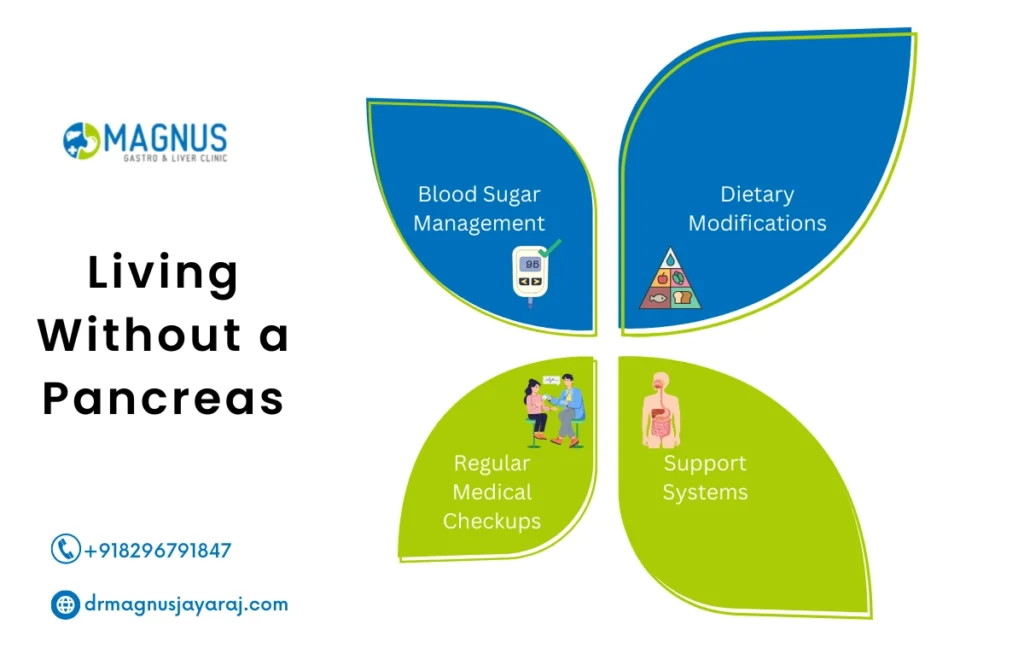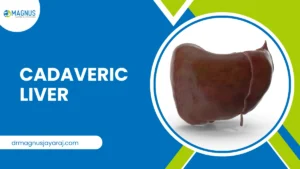Can you live without a pancreas? As a surgeon, I, Dr. Magnus Jayaraj Mansard, can assure you that while the pancreas plays a vital role in regulating blood sugar and aiding digestion, iCan You Live Without a Pancreast is possible to live without it. This often becomes necessary due to conditions like chronic pancreatitis, pancreatic cancer, or severe trauma, requiring a procedure called a total pancreatectomy. After surgery, patients must rely on insulin therapy to manage blood sugar levels and take digestive enzyme supplements for nutrient absorption. Additionally, adopting a low-fat, nutrient-rich diet is essential. While the adjustments can be challenging, with proper medical care and lifestyle changes, you can lead a healthy and fulfilling life even without a pancreas.

What Is a Pancreas?
The pancreas is a small but crucial organ located behind your stomach in the abdomen. Shaped like a flat pear, it’s a part of both the digestive and endocrine systems. It’s responsible for producing enzymes that help break down food and hormones that regulate blood sugar levels. Without this organ, the body needs medical intervention to replicate its functions.
Where Is the Pancreas Located?
Nestled between the stomach and the spine, the pancreas is tucked away in the upper abdomen. This location allows it to connect directly to the small intestine, where it releases digestive enzymes through the pancreatic duct. These enzymes are essential for breaking down carbohydrates, proteins, and fats in the food we consume.
Can You Live Without a Pancreas?
So, can you live without a pancreas? Yes, you can, but it’s not without challenges. Modern medicine has made it possible for individuals to survive and adapt. However, living without a pancreas requires adjustments to your daily routine, including taking medications, managing your diet, and staying vigilant about your health. Life may not return to exactly how it was before, but it can still be fulfilling and manageable. Can you live without a pancreas? The answer lies in understanding the changes and embracing the required care.
What Does the Pancreas Do?
The pancreas serves two main functions:
- Digestive Role: It releases enzymes that aid in breaking down fats, proteins, and carbohydrates in your food. These enzymes are essential for converting food into nutrients that your body can absorb.
- Endocrine Role: It produces hormones like insulin and glucagon, which regulate blood sugar levels and ensure that your cells receive the energy they need to function.
Without a pancreas, your body loses these vital functions, and you’ll need medications to manage digestion and blood sugar levels effectively.
Why Remove a Pancreas in the First Place?
There are specific medical reasons that might require the complete removal of the pancreas a possible known as a total pancreatectomy. Though rare, it is sometimes necessary to save a patient’s life or improve their quality of life.
Common Reasons for Pancreas Removal:
- Pancreatic Cancer: One of the leading causes for removal, especially when tumors are widespread within the pancreas.
- Chronic Pancreatitis: A painful condition involving long-term inflammation that doesn’t respond to other treatments.
- Benign Tumors or Cysts: Some growths may become problematic or have the potential to turn cancerous.
- Genetic Conditions: Disorders like IPMN (intraductal papillary mucinous neoplasm) may warrant removal to prevent future complications.
When discussing the question “Can You Live Without a Pancreas,” it’s often under these critical medical circumstances that the procedure is considered.
Is It Possible to Live Without a Pancreas?
Is it possible to live without a pancreas? The answer is a resounding yes. However, it’s important to note that life after pancreas removal requires significant adjustments. Enzyme replacement therapy and insulin therapy become essential for maintaining your health. With the right medical care and support, you can adapt and lead a fulfilling life despite the challenges. Is it possible to live without a pancreas? Absolutely—and many have proven this with their inspiring resilience.
Pancreas Removal Surgery and Recovery
Surgery to remove the pancreas is a complex procedure performed under general anesthesia. Here’s what you can expect during the recovery phase:
- Hospital Stay: You’ll stay in the hospital for about 1-2 weeks as doctors monitor your condition and manage any immediate complications.
- Enzyme Replacement: You’ll begin taking enzymes to help with digestion since your body can no longer produce them naturally.
- Insulin Therapy: Without a pancreas, your body cannot produce insulin. You’ll start using insulin injections or an insulin pump to regulate your blood sugar levels.
- Dietary Changes: A dietitian can guide you on what to eat and what to avoid to ensure optimal digestion and blood sugar control. Frequent, smaller meals might become your new normal.
- Follow-Up Care: Regular checkups are necessary to ensure that your recovery is on track and that your treatment plan is working effectively.
Living Without a Pancreas
Can you live without a pancreas? Living without a pancreas is entirely possible, but it requires commitment and adjustments. Here are some critical aspects to consider:
- Blood Sugar Management: Insulin therapy is necessary to regulate your blood sugar levels. You’ll need to monitor your levels daily and adjust your insulin dosage as needed.
- Dietary Modifications: Eating a healthy, balanced diet low in fat and sugars is essential. Small, frequent meals can make digestion easier and help you maintain steady blood sugar levels.
- Regular Medical Checkups: Continuous follow-ups with your healthcare provider are necessary to manage your condition effectively and catch any potential issues early.
- Support Systems: Joining a support group can be incredibly helpful for emotional and practical advice on navigating life without a pancreas. Hearing from others who have gone through similar experiences can be a source of comfort and encouragement.
- So, can you live without a pancreas? Yes, you can, with proper medical care, a healthy lifestyle, and a strong support system to help you adapt to the changes.
Living without a pancreas does present challenges, but with the right mindset and support, it is entirely manageable. Many individuals find that they can still pursue their passions and enjoy a high quality of life. Living without a pancreas might seem daunting, but with perseverance and guidance, it becomes a way to thrive.
How Long Can a Person Live Without a Pancreas?
One of the most common concerns is, how long can a person live without a pancreas? The good news is that many individuals live for decades after pancreas removal. The key lies in consistent medical care and lifestyle management.
Factors Influencing Longevity:
- Age at Surgery: Younger individuals tend to recover and adapt more quickly to life without a pancreas.
- Overall Health: Maintaining a healthy weight, avoiding smoking, and staying active can significantly improve long-term outcomes.
- Adherence to Treatment: Consistently taking prescribed medications, monitoring your health, and following medical advice is crucial for longevity.
With dedication and the right medical support, how long can a person live without a pancreas is a question that’s less about limits and more about possibilities. The resilience shown by those who have faced this challenge proves that life goes on with determination.
Is It Possible to Live Without a Pancreas Long-Term?
Let’s address the question again: Is it possible to live without a pancreas long-term? Yes, with advancements in medicine and support, individuals can thrive without a pancreas. Innovations in insulin therapy and enzyme replacement make long-term survival and a good quality of life achievable. It’s important to remain proactive about your health and to build a strong support network to ensure success. Is it possible to live without a pancreas? Long-term success depends on understanding your body’s needs and meeting them head-on.
Key Takeaways:
- Yes, you can live without a pancreas, but it requires lifelong medical management and a commitment to your health.
- Insulin and enzyme therapy are critical for survival and maintaining a good quality of life.
- A healthy lifestyle and a proactive approach to medical care are essential for thriving without a pancreas.
- Regular monitoring by a healthcare professional ensures proper management and prevents complications.
Conclusion
Can you live without a pancreas? Yes, you can, and with the right care and adjustments, you can live a fulfilling life. Dr. Magnus Jayaraj Mansard emphasizes the importance of close collaboration with your healthcare team. While the journey may seem daunting, many individuals have successfully navigated life without a pancreas and continue to thrive. Can you live without a pancreas? Yes, and with proper guidance, life can still be rewarding.




